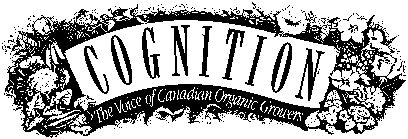

Cognition Index | Virtual Library
| Magazine Rack
Search
| Join the Ecological Solutions Roundtable
by RaphaŽl Thierrin
Background
My Master of Environmental Design project at the University of Calgary was partially funded by COG’s Mary Perlmutter Scholarship. I reviewed whether environmental auditing is applicable to prairie farms. Environmental auditing is a tool for measuring the environmental performance of a facility, such as a well site or a manufacturing plant. Coincidentally, the organic certification process also reviews one facility at a time, namely a farm, for the purpose of identifying whether it is environmentally sustainable.
Thus, a significant portion of my research tried to answer these questions:
• does the organic certification process actually address sustainability issues pertinent to the prairies?
• what can be learned by comparing environmental auditing with organic certification?
• how could either be improved?
Findings:
First the good news for the organic industry.
The organic certification system is designed in such a way that it can either fully or partially address all ten sustain-ability issues I identified as pertinent for the prairies, from soil erosion to maintenance of biodiversity. For example, certification standards clearly spell out that ensuring a continued soil quality is an important criterion in honoring a farm with the label ‘certified’. Biodiversity and environmental stewardship are not yet criteria in organic standards, but inspectors trained by the Independent Organic Inspectors Association (IOIA) are expected to review and comment on them.
The peer review, third party certification process pioneered by the Organic Crop Improvement Association and advocated by COAB has two major strengths: it is managed by individuals who live in the same bioregion as the producer, and it has educational, problem-solving components.
I recommended that environmental audits performed for farms, organic or nonorganic, should embody these features.
Now, unfortunately, comes the bad news:
It is questionable whether certification bodies (CBs) are able to address environmental concerns well, even when they have been raised and documented by organic inspectors. Virtually all aspects of organic certification are severely under-budgeted: inspectors work long hours for very little money; many CBs have no administrative or research staff; and they rely on volunteers who are extremely busy in the summer months. Direct implications of this are:
• slow and erratic follow-up to recommendations made by inspectors;
• high variance in inspectors’ knowledge, writing and analytical skills;
• vulnerability of a CB’s credibility with the loss of just one key volunteer.
The current increase in certification activity is likely to magnify these stress-faults. Eventually, one of these cracks may put the credibility of the organic industry in jeopardy.
Recommendations:
Now that the size of the organic industry brings its internal mechanisms into the limelight, it is important that the industry be able to ensure that it certifies only farmers who follow environmentally sustainable practices.
I recommend the following:
1. The first inspection should be a full-fledged environmental audit, i.e., based on organic standards but also on other environmental criteria.
2. Recommendations from the first inspection need to be followed within a minimum period, say three years, otherwise the farmer is not eligible to apply for certification.
3. Inspectors’ qualifications should be screened more thoroughly by IOIA or other training agencies.
4. Inspectors should be compensated fairly for their time and expertise.
5. CBs should afford the time to review inspectors’ recommendations thoroughly and take appropriate steps if a producer fails to follow them.
6. COAB should assist CBs in obtaining the training and resources needed to make effective administrative and environmental decisions.
I have a final recommendation to COGNITION, which is currently the only national carrier of information on the organic industry. I feel that it could and should be a forum for discussions on how the certification system can and should be improved, so that the equation "Organic = Sustainable" continues to be valid.
RaphaŽl Thierrin currently develops WEB sites and urban agriculture projects in Calgary. His research will be presented at IFOAM ’96 in Copenhagen. He is President of the Sustainable Agriculture Association (SAA), an Alberta organic association which supports COAB and its strengthening. To respond to his comments, contact him at <raphael@ecobio.com> or at (403) 686-3310.
Copyright © 1996.
RaphaŽl Thierrin.Reprinted with permission. All rights reserved.
Info Request | Services | Become EAP Member | Site Map
Give us your comments about the EAP site
Ecological Agriculture Projects, McGill University (Macdonald
Campus)
Ste-Anne-de-Bellevue, QC, H9X 3V9 Canada
Telephone:
(514)-398-7771
Fax:
(514)-398-7621
Email: info@eap.mcgill.ca
To report problems or otherwise comment on the structure of this site, send mail to the Webmaster